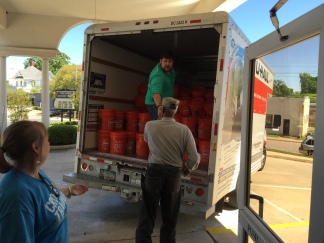“When we don’t know what to do, we know what to do.”
-Bishop Cynthia Harvey quoting Louisiana United Methodists (source)
When you start pretty much any job I know of, your job description includes, “other duties as assigned.” This is certainly the case in pastoral ministry. On Monday, my “other duties as assigned” included being a hot shot driver, as I delivered 250 cleaning buckets to Marshall, Texas to help that community clean up from the recent flooding along the Texas/Louisiana border.
Cleaning buckets are an UMCOR standard, and are really helpful to people mucking out their homes or businesses following natural disasters. UMCOR, for folks who aren’t fluent in Metho-babble, stands for United Methodist Committee on Relief; it’s our disaster and humanitarian relief organization, and it is awesome.
As I was driving home to the smooth, smooth sounds of a vibrating, rattling, whining box truck, I started thinking about the quote at the beginning of this post. Given their geography and history, I’m sure Louisiana United Methodists are as good as it gets at responding to crisis.
But you know what? In general, the United Methodist Church is really, really good at responding when it’s really, really bad. In moments of humanitarian or natural disaster, United Methodist Christians from all theological perspectives and parts of the world spring into action to work together quickly, faithfully, and decisively. In these moments, we look like the sort of people who are truly committed to building the Kingdom of God.
If only we could behave the way we do in the midst of disaster when we come together to try and set a structure and a vision for our church in our quadrennial General Conference meetings. If we were able to work together, to focus on our shared commitments and set a course for our church that allows us to all faithfully do the work we’re called to do. The United Methodist Church could really take a lesson from ourselves, we could learn from what we do when we don’t know what to do.
Because we aren’t just flying by the seat of our pants in the face of disaster. Prior to being elected bishop, Bishop Harvey was in charge of the United Methodist Committee on Relief. She assumed this role in the midst of tragedy. The Deputy General Secretary prior to her was a man named Sam Dixon. Dixon died in Haiti during the catastrophic earthquake in 2010. Rev. Dr. Dixon was in Haiti before the earthquakes doing humanitarian work.
The United Methodist Church does such good relief work because we do an incredibly good job of building our infrastructures and systems that allow us to respond quickly and effectively. We have people on the ground before disasters strike, and we have built a system that allows every dollar given to disaster recovery to go to that work. And Methodists from all around the connection trust in UMCOR to do its work well.
But at General Conference, this is not what our work together looks like. We are a global church with a rich and diverse theological history held together by our Wesleyan heritage and our unique polity and governance structures. But lately, instead of celebrating that and finding ways to support it, we yell at each other about sexuality for two weeks, don’t address any of our other issues, and leave feeling wounded and even further divided.
Many people of my own theological perspective, one which seeks full and meaningful inclusion of LGBTQ people into the life of the United Methodist Church, feel as if our current doctrine and structures keep us from fully engaging in the kind of work we are called by God to do.
Many people of a theological perspective which views homosexuality as sinful feel as if changing our rhetoric on this subject would be catastrophic to our church and take us away from our historical values.
Both of these viewpoints are deeply held and serious, biblically-based convictions. But they don’t just keep us from coming up with a way forward as it relates to issues of human sexuality. We don’t trust each other, so all proposals for any sort of change or development that would help create a church structure better able to address our rapidly changing world become a referendum on sexuality. And it’s killing us.
I hope for a day in which we realize our common goals, in which we make authentic space for the whole of United Methodism to do God’s work in the world, to make disciples of Jesus Christ for the transformation of the world.
What if we responded to slow-moving crises the way we respond to fast-moving ones? What if we did the hard and necessary work of developing an infrastructure that allowed us to work boldly and decisively for the Kingdom of God?
I pray that we realize that we are a people who know what to do when we don’t know what to do. And I pray that we get to work doing it!



I very much admired your conversations initiated by Bishop Jones in Holy conversations Tough Issues. I have brought the subject of Human Sexuality and Church Decisions up several times, just because I am convicted that it needs to be addressed and talked out. Often discussions defuse the emotion, if they are properly held.
I have heard the statement too often “The day we have homosexual marriages in our church is the day I stop becoming a Methodist” I am certain that there will be division no matter what the Discipline determines, but I just hope that not too many valuable members will abandon the United Methodist Church over this issue.
I am prayerful that this discussion can be brought out so more members can have a chance to examine their own feeling and give the topic deep prayer, thought, and discernment of the Holy Spirit instead of a gut reaction.
LikeLike